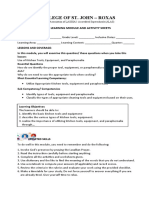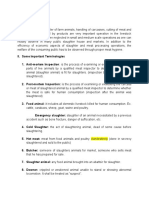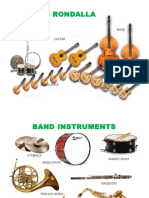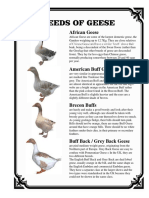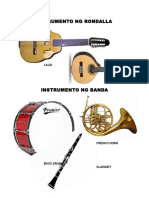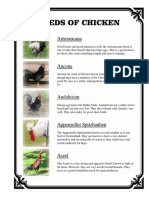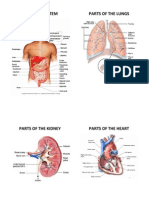0 ratings0% found this document useful (0 votes)
56 viewsMeasuring Devices: 1. Scales
Measuring Devices: 1. Scales
Uploaded by
leijuliaThis document summarizes various measuring devices used in cooking and food preparation. Scales are important for measuring ingredients by weight accurately. Volume measures like measuring cups and spoons are used for liquids and small dry ingredients. Ladles, scoops, and thermometers also have specific uses - ladles for serving liquids, scoops for portioning soft foods, and thermometers for measuring temperature of foods during and after cooking. Meat thermometers inserted before and during cooking indicate the internal temperature of meats. Instant-read thermometers give fast readings but should not be left in foods during cooking.
Copyright:
© All Rights Reserved
Available Formats
Download as PDF, TXT or read online from Scribd
Measuring Devices: 1. Scales
Measuring Devices: 1. Scales
Uploaded by
leijulia0 ratings0% found this document useful (0 votes)
56 views1 pageThis document summarizes various measuring devices used in cooking and food preparation. Scales are important for measuring ingredients by weight accurately. Volume measures like measuring cups and spoons are used for liquids and small dry ingredients. Ladles, scoops, and thermometers also have specific uses - ladles for serving liquids, scoops for portioning soft foods, and thermometers for measuring temperature of foods during and after cooking. Meat thermometers inserted before and during cooking indicate the internal temperature of meats. Instant-read thermometers give fast readings but should not be left in foods during cooking.
Original Description:
cooking equipment
Original Title
Measuring Devices
Copyright
© © All Rights Reserved
Available Formats
PDF, TXT or read online from Scribd
Share this document
Did you find this document useful?
Is this content inappropriate?
This document summarizes various measuring devices used in cooking and food preparation. Scales are important for measuring ingredients by weight accurately. Volume measures like measuring cups and spoons are used for liquids and small dry ingredients. Ladles, scoops, and thermometers also have specific uses - ladles for serving liquids, scoops for portioning soft foods, and thermometers for measuring temperature of foods during and after cooking. Meat thermometers inserted before and during cooking indicate the internal temperature of meats. Instant-read thermometers give fast readings but should not be left in foods during cooking.
Copyright:
© All Rights Reserved
Available Formats
Download as PDF, TXT or read online from Scribd
Download as pdf or txt
0 ratings0% found this document useful (0 votes)
56 views1 pageMeasuring Devices: 1. Scales
Measuring Devices: 1. Scales
Uploaded by
leijuliaThis document summarizes various measuring devices used in cooking and food preparation. Scales are important for measuring ingredients by weight accurately. Volume measures like measuring cups and spoons are used for liquids and small dry ingredients. Ladles, scoops, and thermometers also have specific uses - ladles for serving liquids, scoops for portioning soft foods, and thermometers for measuring temperature of foods during and after cooking. Meat thermometers inserted before and during cooking indicate the internal temperature of meats. Instant-read thermometers give fast readings but should not be left in foods during cooking.
Copyright:
© All Rights Reserved
Available Formats
Download as PDF, TXT or read online from Scribd
Download as pdf or txt
You are on page 1of 1
Measuring Devices
1. Scales
Most recipe ingredients are measured by
weight, so accurate scales are important.
Portion scales are used for measuring
ingredients as well as for portioning
products for service. Traditional portion
scales are spring-operated and usually have
a dial to indicate weight. More accurate
digital scales are electrically operated and
provide a digital read out.
2. Volume
measures
Volume measures used for liquids have lips
for easy pouring. Sizes are pints, quarts, halfgallons, and gallons. Each size is marked off
into fourths by ridges on the sides.
3. Measuring cup
Utensil to accurately measure liquid volume
of ingredients. Often in both metric and
American units
4. Measuring
spoons
Utensils for measuring small amounts of
both dry and liquid ingredients accurately
5. Ladles
Large deep spoon used to serve soups, stews,
punch and sauces
6. Scoops
Scoops come in standards sizes and have a
lever for mechanical release. They are used
for portioning soft solid foods. The number
of scoop indicates the number of level
scoopfuls per quart. In actual use, a rounded
scoopful is often more practical than a level
scoopful, so exact weights will vary.
Measure temperature. There are many kinds
for many purposes.
7. Thermometer
8. Meat
thermometer
A meat thermometer indicates internal
temperature of meats. It is inserted before
cooking and left in the product during
cooking.
9. Instant-read
thermometer
An instant-read thermometer gives readings
within a few seconds of being inserted in a
food product. It reads from 0F to 220F.
Many chefs carry these in their jacket pocket
like a pen, ready whenever needed. Instantread thermometers must not be left in meats
during roasting, or they will be damaged.
You might also like
- Kitchen Tools, Utensils and Equipment: Tle 7 - Commercial CookingDocument48 pagesKitchen Tools, Utensils and Equipment: Tle 7 - Commercial CookingMarifel Chua Valentino100% (9)
- Tle - Afa-Fp: Quarter 4 - Module 1Document15 pagesTle - Afa-Fp: Quarter 4 - Module 1Erl CasiñoNo ratings yet
- EDITED Q1-Cookery-Module-LESSON-02 Measuring-Tools-and-EquipmentDocument5 pagesEDITED Q1-Cookery-Module-LESSON-02 Measuring-Tools-and-EquipmentMay Ann GuintoNo ratings yet
- LESSON 6 (History of Appetizer0Document22 pagesLESSON 6 (History of Appetizer0mary ann morenoNo ratings yet
- Breeds of GoatDocument4 pagesBreeds of Goatleijulia100% (1)
- Ducks BreedDocument7 pagesDucks BreedleijuliaNo ratings yet
- Pots, Pans and ContainersDocument2 pagesPots, Pans and ContainersleijuliaNo ratings yet
- Advance Baking Final Lesson 2Document13 pagesAdvance Baking Final Lesson 2Richiel Bayon-onNo ratings yet
- Measuring Tools-WPS OfficeDocument4 pagesMeasuring Tools-WPS OfficeJunar AlarconNo ratings yet
- 3.0.kitchen Equipment and ToolsDocument13 pages3.0.kitchen Equipment and ToolsAlina-Alexandra PoschinăNo ratings yet
- Food Processing Lesson 1Document20 pagesFood Processing Lesson 1monaliza gumbay100% (2)
- Group ActivityDocument6 pagesGroup ActivityKenneth AcostaNo ratings yet
- Module 3 Lesson 1 CookeryDocument4 pagesModule 3 Lesson 1 Cookeryhabibi jervie100% (1)
- Carry Out Measurements and Calculations in A Required Task: Learning Activity SheetDocument6 pagesCarry Out Measurements and Calculations in A Required Task: Learning Activity SheetLorraine Venzon100% (2)
- Measuring ToolsDocument45 pagesMeasuring ToolsJezreel Kyllie TelanNo ratings yet
- Fish Processing 8 q3 w1 ObreroDocument9 pagesFish Processing 8 q3 w1 ObreroClarence B. MacaraegNo ratings yet
- Modular Activity For TLE 7 - April 8 - 12Document9 pagesModular Activity For TLE 7 - April 8 - 12MARIA ANGELICA NOCHENo ratings yet
- He Cookery Gr7 8 q1 Module 2 FinalDocument16 pagesHe Cookery Gr7 8 q1 Module 2 FinalJoy Cabug LemosneroNo ratings yet
- Week 3tle Grade 8Document10 pagesWeek 3tle Grade 8Mishelle PadugaNo ratings yet
- Exploratory COOKERY Q1 M3Document17 pagesExploratory COOKERY Q1 M3Aliyah Emilyn T. DulaNo ratings yet
- Las #8 - MeasurementsDocument4 pagesLas #8 - Measurementsjohn lastNo ratings yet
- 2.0.5 Tools and Equipment For Measuring and Marking OutDocument7 pages2.0.5 Tools and Equipment For Measuring and Marking OuttheopahweebNo ratings yet
- Lesson 1: Basic Kitchen Tools and Equipment Grade 8Document41 pagesLesson 1: Basic Kitchen Tools and Equipment Grade 8Syesha Alvarez100% (1)
- DONE TLE Measurements and WEEK 4Document30 pagesDONE TLE Measurements and WEEK 4Maricar Collado GarciaNo ratings yet
- TLE AFA10 - Food Pro - Q1 - W1 2Document17 pagesTLE AFA10 - Food Pro - Q1 - W1 2Mary Grace Pesalbo100% (1)
- TLE 7 Commercial Cooking - PPT 7Document64 pagesTLE 7 Commercial Cooking - PPT 7FSBTLED Nathan VinceNo ratings yet
- Kitchen MeasurementDocument29 pagesKitchen MeasurementruizmorineaNo ratings yet
- Dry Ingredient: Purchase Measuring SpoonsDocument4 pagesDry Ingredient: Purchase Measuring SpoonsMarge Dimailig100% (1)
- CapSLET FFP G7 01 NEW W1Document13 pagesCapSLET FFP G7 01 NEW W1Cristy Falcasantos AranjuezNo ratings yet
- Midle TestDocument3 pagesMidle TestHanna KimNo ratings yet
- Cookery: Quarter I - Module 1: Kitchen Tools, Equipment, and ParaphernaliaDocument17 pagesCookery: Quarter I - Module 1: Kitchen Tools, Equipment, and ParaphernaliaArmie ValdezNo ratings yet
- FOODS and NUTRITIONDocument23 pagesFOODS and NUTRITIONKriselle Jeanne TayoNo ratings yet
- How To Turn Good Recipes Into Great Menu ItemsDocument6 pagesHow To Turn Good Recipes Into Great Menu ItemsVicManT.MolinaNo ratings yet
- FP Lesson 3Document31 pagesFP Lesson 3idk588415No ratings yet
- WEEK-3Document40 pagesWEEK-3aielgianflores1011No ratings yet
- Grade 8 Lesson 3Document34 pagesGrade 8 Lesson 3Kyle Daphne SumpayNo ratings yet
- Grade 7 LessonDocument24 pagesGrade 7 LessonBLESLYN CLAIRE LORENZO A.No ratings yet
- COOKERY - PERFORM MENSURATION Using Measuring ToolsDocument18 pagesCOOKERY - PERFORM MENSURATION Using Measuring ToolsMelanie Macatangay100% (1)
- Cookery 1 Chapter 1Document96 pagesCookery 1 Chapter 1Lennard SegundoNo ratings yet
- FOOD PROCESSING - The Food Processing PlantDocument5 pagesFOOD PROCESSING - The Food Processing Plantjessapascual315No ratings yet
- AFA-food ProcessingDocument50 pagesAFA-food ProcessingJenny Fausto MonrealNo ratings yet
- Learning Modules - TLE 8Document31 pagesLearning Modules - TLE 8Lou GarcillanoNo ratings yet
- LABORATORY ACTIVITY NO.1 - MeasurementsDocument6 pagesLABORATORY ACTIVITY NO.1 - MeasurementsLester RudaNo ratings yet
- Kitchen Math - Measuring With Megan Sept2021Document2 pagesKitchen Math - Measuring With Megan Sept2021joejoeNo ratings yet
- Cleaning and SanitationDocument38 pagesCleaning and SanitationLaila ArcillasNo ratings yet
- College of St. John - Roxas: Self-Learning Module and Activity SheetsDocument13 pagesCollege of St. John - Roxas: Self-Learning Module and Activity SheetsMa. Thea Diane BillonesNo ratings yet
- Dining Room Preparation & Table SettingDocument30 pagesDining Room Preparation & Table SettingMerry Joy A. LongosNo ratings yet
- Beverage Industry Has Gone Up To 880,000 in 2013 and Is Expected To Increase As The Food Processing Industry ExpandsDocument12 pagesBeverage Industry Has Gone Up To 880,000 in 2013 and Is Expected To Increase As The Food Processing Industry ExpandskristineNo ratings yet
- Use Standard Measuring Devices/InstrumentsDocument10 pagesUse Standard Measuring Devices/InstrumentsEdrian OmbeNo ratings yet
- Applying Mathematics in FoodDocument10 pagesApplying Mathematics in FoodSIMI FELIXNo ratings yet
- Activity #7 - Day 7 (March 10, 2021 - Wednesday) : Menus, Recipes and Cost ManagementDocument10 pagesActivity #7 - Day 7 (March 10, 2021 - Wednesday) : Menus, Recipes and Cost ManagementMark Anthony LibecoNo ratings yet
- Identify The FollowingDocument1 pageIdentify The FollowingLorie Anne ValleNo ratings yet
- Lesson 2 Cookery 7Document19 pagesLesson 2 Cookery 7CATHELINE JANE MANGUIATNo ratings yet
- TLE ExploratoryCookery7 Q1Module5 Week5Document11 pagesTLE ExploratoryCookery7 Q1Module5 Week5Antonio Caballero100% (1)
- As - Week 2 - Q4Document13 pagesAs - Week 2 - Q4Jessica MotarNo ratings yet
- G7Utilizing Appropriate Kitchen ToolsDocument8 pagesG7Utilizing Appropriate Kitchen ToolsVia LiwanagNo ratings yet
- Culinary Skills I HOSF 1023: H112, H100, H601 Culinary Skills - Chef Training Culinary ManagementDocument152 pagesCulinary Skills I HOSF 1023: H112, H100, H601 Culinary Skills - Chef Training Culinary Managementb9521441No ratings yet
- Bread & Pastry Production: Quarter 3 Cutting Portion-ControlledDocument11 pagesBread & Pastry Production: Quarter 3 Cutting Portion-ControlledShekinahJewel67% (3)
- Las 3 Q Week 1 Fish ProcessingDocument14 pagesLas 3 Q Week 1 Fish ProcessingShien Zan SouNo ratings yet
- Introduction To Kitchen Tools and EquipmentDocument8 pagesIntroduction To Kitchen Tools and EquipmentmaryroserodriguezpaleroNo ratings yet
- Measuring Ingredients Correctly: Worksheet #5 Lesson: Carryout Measurements and CalculationsDocument4 pagesMeasuring Ingredients Correctly: Worksheet #5 Lesson: Carryout Measurements and CalculationsJANICE RUBIALESNo ratings yet
- Famous Filipino Composers: Arthly Joniel C. Dela CruzDocument9 pagesFamous Filipino Composers: Arthly Joniel C. Dela CruzleijuliaNo ratings yet
- SLAUGHTERINGDocument36 pagesSLAUGHTERINGleijuliaNo ratings yet
- Arthly Fruit BearingDocument14 pagesArthly Fruit BearingleijuliaNo ratings yet
- Wind InstrumentDocument3 pagesWind InstrumentleijuliaNo ratings yet
- Musical InstrumentDocument4 pagesMusical InstrumentleijuliaNo ratings yet
- Invasion Games AlbueroDocument7 pagesInvasion Games AlbueroleijuliaNo ratings yet
- Breeds of CattleDocument5 pagesBreeds of CattleleijuliaNo ratings yet
- List of Filipino ComposersDocument1 pageList of Filipino ComposersleijuliaNo ratings yet
- Rondalya InstrumentDocument5 pagesRondalya InstrumentleijuliaNo ratings yet
- Arc Welding FaultsDocument7 pagesArc Welding FaultsleijuliaNo ratings yet
- String InstrumentDocument2 pagesString InstrumentleijuliaNo ratings yet
- Cooking Equipment: 2. Open ElementDocument4 pagesCooking Equipment: 2. Open ElementleijuliaNo ratings yet
- Parts of PowerpointDocument2 pagesParts of PowerpointleijuliaNo ratings yet
- Breeds of GeeseDocument3 pagesBreeds of GeeseleijuliaNo ratings yet
- Jose Rizal Exile in DapitanDocument5 pagesJose Rizal Exile in Dapitanleijulia100% (4)
- Music InstrumentsDocument2 pagesMusic InstrumentsleijuliaNo ratings yet
- Chicken BreedsDocument7 pagesChicken Breedsleijulia100% (1)
- Endangered Plants in The PhilDocument1 pageEndangered Plants in The PhilleijuliaNo ratings yet
- TR Barista NC IIDocument55 pagesTR Barista NC IImicah ramosNo ratings yet
- TR Local Guiding Services NC IIDocument52 pagesTR Local Guiding Services NC IIleijulia75% (4)
- Maintenance ScheduleDocument1 pageMaintenance Scheduleleijulia60% (5)
- Digestive System Parts of The LungsDocument4 pagesDigestive System Parts of The LungsleijuliaNo ratings yet
- Fried Bangus Kare KareDocument2 pagesFried Bangus Kare KareleijuliaNo ratings yet
- Kinds of PlantsDocument1 pageKinds of PlantsleijuliaNo ratings yet
- TR Barista NC IIDocument55 pagesTR Barista NC IImicah ramosNo ratings yet
- Language Assesssment For Primary Grade 3 ReviewerDocument2 pagesLanguage Assesssment For Primary Grade 3 ReviewerleijuliaNo ratings yet
- TR - Programming (NET Technology) NC IIIDocument60 pagesTR - Programming (NET Technology) NC IIIleijulia50% (2)













































